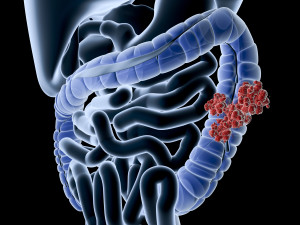Colon Cancer
What is Colon Cancer?
Colon cancer is diagnosed in over 140,000 Americans each year. This cancer causes tumors in the large intestine, which is the lower part of your digestive system. Colon cancer can have a very high recovery rate if caught in its earliest stages with a screening procedure called a colonoscopy. Expert Los Angeles gastroenterologist Dr. Peyton Berookim encourages his patients to schedule life-saving procedures like colonoscopies to diagnose colorectal conditions and detect early signs of colon cancer. Following the recommended colon screening guidelines is crucial to protecting your digestive health for years to come. Contact Dr. Berookim, the colon cancer treatment Los Angeles specialist at the Gastroenterology Institute of Southern California today to schedule your colonoscopy and to learn more about colon cancer prevention.

Who Gets Colon Cancer?
Individuals with unhealthy lifestyles may have a higher risk of developing colon cancer. According to studies, increased intake of alcohol, tobacco products, and high-fat foods all contribute to the chances of being diagnosed with this disease. People who do not exercise regularly and those who fail to attend regular check ups with their doctors are also at risk, as are patients over the age of 50. Genes also play a role in the likelihood that a person will be diagnosed with colon cancer, and patients who have relatives with the disease should pursue early screening. Finally, men are more likely than women to develop colorectal cancers, and African Americans are more likely to get colon cancer than individuals of other ethnic backgrounds. Find out more about colon cancer treatment Los Angeles
Colon Cancer Screenings
Colon cancer is one of the most treatable cancers, provided it is detected early. Because the disease can be asymptomatic until the later stages, undergoing regular colonoscopies is essential. The colonoscopy procedure is widely regarded as the most effective way for gastroenterologists to detect rectal or colon cancers. Doctors recommend that patients undergo a first screening at age 50 and follow-up tests every 10 years. Because of their higher risk factor, African Americans should begin testing at 45. People with a family history of the disease should start undergoing colonoscopies ten years before the age at which their relatives were diagnosed.
Because the colon must be clean so doctors can detect any and all polyps, a thorough colonoscopy preparation is essential. Before your procedure, Dr. Berookim will provide careful instructions for drinking the colonoscopy preparation beverages. You will also need to avoid eating or drinking anything except clear liquids for a period of time before the procedure.
You will be under conscious sedation during your colonoscopy and should experience no pain or discomfort. During the procedure, your doctor will insert a colonoscope, which is a thin, flexible tube with a video camera attached, into the anus. The camera will be able to capture the whole length of your colon, enabling your doctor to spot any abnormalities. To find out more information about colonoscopies, visit our procedures page.
Colon Cancer Symptoms and Diagnosis
Most people with colorectal cancer do not show any symptoms in the early stages of the disease. When they do present, symptoms may vary depending on the location of the cancer in the colon and how far it has progressed. Patients who experience any of the following symptoms should contact Dr. Berookim to schedule a consultation:
- Fatigue or weakness
- Rapid or unexplained weight loss
- Abdominal pain
- Rectal bleeding/blood in your stool
- Change in bowel movements like diarrhea or constipation
- Change in consistency of your stool
In the case that an abnormality is detected during your colonoscopy, Dr. Berookim may suggest additional tests including:
Biopsy
If a polyp suspected of being cancerous is found during a colonoscopy or other diagnostic test, it will be biopsied by your GI doctor and inspected. During the biopsy, your doctor will remove a small piece of the tissue with a special instrument. On rare occasions, a portion of the colon may need to be surgically removed to make the diagnosis.
Blood Tests
Certain blood tests are used to diagnosis colon cancer. Your doctor may check your blood’s liver enzyme, complete blood count, and tumor markers like carcinoembryonic antigen (CEA) and CA19-9.
Imaging Tests
CT scans, MRIs, chest X-rays, PET scans, angiographies, and ultrasounds may all be utilized by your doctor to find the cancer.
Contact Dr. Berookim
Colon cancer is easier to beat if caught in its early stages. For this reason, scheduling regular colonoscopies with Dr. Berookim, the colon cancer treatment Los Angeles specialist is the best way to protect the long-term health of your digestive system. If you have further questions about colon cancer, or if you would like to schedule a colonoscopy, please call the GI Institute of Southern California at (310) 271-1122.

